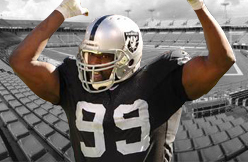Though his best football was left behind in Tampa Bay, where he won a Super Bowl and polished his Pro Football Hall of Fame credentials, Warren Sapp still had plenty to offer when he signed with the Raiders in 2004.
Sapp was the voice of experience, a locker-room counselor who often settled in front of his cubicle to dispense advice to teammates, team employees and even reporters.
He was loud, sometimes obnoxious, but he usually made sense.
So the news that Sapp is the latest former multimillionaire athlete to file for bankruptcy was a surprising jolt of reality.
Athletes frequently go broke, but it seems we're in the midst of an epidemic. Recent news accounts have told the sad tales of -- take a deep breath -- Dennis Rodman, Terrell Owens, Lenny Dykstra, Antoine Walker and Allen Iverson. They all made tens of millions and lost it.
Sapp, though, figured to avoid that fate. He seemed to have learned from his restless youth, when he fathered two children with his wife and two more with other women. Divorce had made him more thoughtful and discerning. He retired with relative quiet and made a smooth transition to the TV studio.
Sapp's big, bold personality graced Showtime and NFL Network, even got him a gig on ABC's "Dancing With The Stars."
But behind the contented grin and the hearty laugh was a man who had made a string of unwise business decisions and, moreover, felt the sharp end of those relationships.
He now is a cautionary tale, but how often do folks actually study and learn?
Too many athletes spend as if their money is being grown on a 400-acre orchard. They trust the wrong people, too often turn to "friends" and relatives, actual and otherwise, for advice and investments. They dive onto the money pile, having so much fun they fail to realize their dollars are evaporating.
Why on earth won't these slow-motion train wrecks pick up a phone and start making calls until they reach another ex-jock who also has been in the news lately -- but for impressive and admirable reasons.
Magic Johnson is the face of the group selected to purchase the Los Angeles Dodgers. The $2.15 billion bid submitted by Guggenheim Partners not only leveled the competition but stands to change the landscape at the highest levels of all major American sports. If the transaction is approved, perhaps as soon as this week, the vast majority of current MLB owners instantly become appreciably richer.
Though Johnson is not the primary money man in this proposed deal, his very visible involvement speaks to his astonishing rise from a national championship at Michigan State to world championships with the Los Angeles Lakers to an oversized seat at end of the biggest tables of high finance.
While Michael Jordan and Tiger Woods built their financial empires through uniquely spectacular careers and immensely profitable marketing partnerships, Magic's came through building relationships. He learned from Lakers owner Jerry Buss, picked the brains of the moneyed folk sitting courtside at games in L.A.
Though he partied plenty during his NBA career, Johnson also was careful about spending, insistent on saving and committed to financial growth. He spent $10 million to buy a small percentage of the Lakers in 1994 and sold it for at least three times that in 2010.
He made less than $20 million in salary as a player, and now he likely is the world's richest ex-athlete, with net worth estimates as low as $500 million (Forbes magazine) and as high as $800 million (Fortune magazine).
Moreover, Johnson is a titan in the community. His companies, largely concentrated in underserved areas, employ an estimated 40,000 people.
And folks thought Magic was "set for life" in 1981, when he signed a $25 million, 25-year Lakers contract that was the biggest and longest deal in pro sports history.
Twenty years after many presumed he would die young as a result of an AIDS-related disease, Magic is the template for athletes who wish to avoid going broke. He says he gets calls all the time from active athletes seeking advice.
Why wouldn't a guy like Scottie Pippen or John Daly or Latrell Sprewell or Walker or Sapp -- who I know appreciates intellect and welcomes knowledge -- reach out before their pockets are empty?
Failing to seek advice, or ignoring it, is as unfathomably dense or stubborn as ringing up a $20,000 bar tab, staggering to a $150,000 car and getting behind the wheel -- rather than spending $500 for a driver.
Such inexplicable negligence happens far too often among athletes. So sad, when it's so incredibly easy to avoid.

(mercurynews.com)



